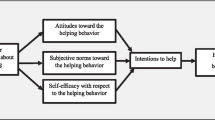Abstract
Male subjects, purportedly being observed by an audience, received failure feedback while working on a task (rating dialogues for neuroticism). Help was readily available, from a male or female assistant, and the primary dependent variable was whether or not subjects requested help. Embarrassment was postulated as the major inhibitor of help seeking in this situation. Self-report measures of embarrassment and perceived accuracy were taken throughout the session. The independent variables were: task centrality (sex-role appropriateness), sex of assistant, expectation of future interaction with the audience, self-esteem, and sex-role ideology (“traditional” vs “feminist” beliefs). The principal results for help seeking were: high esteem traditional subjects sought help less frequently on the central (male) task and more frequently sought help on the peripheral (female) task; feminists did not differ in help seeking according to sex of task. Increased embarrassment was not generally associated with inhibition of help seeking. In fact, there was a trend for high embarrassment to be reported immediately before help was sought. To explain these results, two forms of embarrassment are distinguished — the embarrassment due to continued failure, which should result in seeking help to bring about success, and anticipated embarrassment involved in the act of seeking help, which should inhibit help-seeking behavior.
Similar content being viewed by others
References
Allen, B. A visit from Uncle Macho. In J. H. Pleck & J. Sawyer (Eds.), Men and masculinity. Englewood Cliffs: Prentice-Hall, 1974, 5–6.
Broll, L. T., Gross, A. E., & Piliavin, I. M. Effects of offered and requested help on help seeking and reactions to being helped. Journal of Applied Social Psychology, 1974, 4, 244–258.
Brown, B. R. Face-saving following experimentally induced embarrassment. Journal of Experimental Social Psychology, 1970, 6, 255–271.
Gergen, K. J. Toward a psychology of receiving help. Journal of Applied Social Psychology, 1974, 4, 187–193.
Goffman, E. On face work. Psychiatry, 1955, 18, 213–231.
Gross, A. E., Wallston, B. S., & Piliavin, I. M. The help recipient: A social psychological perspective. In D. H. Smith & J. Macaulay (Eds.), Voluntary Action Research 1975: Individual voluntary action, altruism, and leisure activity. San Francisco: Jossey-Bass, in press.
Hartley, R. E. Sex-role pressures and the socialization of the male child. In J. H. Pleck & J. Sawyer (Eds.), Men and masculinity. Englewood Cliffs: Prentice Hall, 1974, 7–13.
Krebs, D. L. Altruism — an examination of the concept and a review of the literature. Psychological Bulletin, 1970, 73, 258–302.
Macaulay, J., & Berkowitz, L. (Eds.), Altruism and helping behavior. New York: Academic Press, 1970.
Modigliani, A. Embarrassment and embarrassability. Sociometry, 1968, 31, 313–326.
Modigliani, A. Embarrassment, facework, and eye contact: Testing a theory of embarrassment. Journal of Personality and Social Psychology, 1971, 17, 15–24.
Morris, S. C., & Rosen, S. Effects of felt adequacy and opportunity to reciprocate on help seeking. Journal of Experimental Social Psychology, 1973, 9, 265–276.
Petras, J. W. Sex: Male/Gender: Masculine. Port Washington, N.Y.: Alfred Publishing Co., 1975.
Pleck, J. H. & Sawyer, J. Men and masculinity. Englewood Cliffs: Prentice-Hall, 1974.
Rotter, J. B. Social learning and clinical psychology. New York: Prentice Hall, 1954.
Sherwood, J. J. Self-identity and self-actualization: A theory and research. (Doctoral dissertation, University of Michigan, 1962).
Silverstein, M. The history of a short unsuccessful academic career. In J. W. Petras (Ed.), Sex: Male/Gender: Masculine. Port Washington, N.Y.: Alfred Publishing Co., 1975, 236–265.
Tessler, R. C. Help-seeking behavior and negative self-influences. Unpublished master's thesis, University of Wisconsin, 1970.
Tessler, R. C., & Schwartz, S. H. Help seeking, self-esteem, and achievement motivation: An attributional analysis. Journal of Personality and Social Psychology, 1972, 21, 318–326.
Wallston, B. S. The effects of sex role, self-esteem, and expectation of future interaction with an audience on help seeking. (Doctoral dissertation, University of Wisconsin, Madison, 1972).
Author information
Authors and Affiliations
Additional information
This research was supported in part by Public Health Service Predoctoral Fellowship #5-MH-48172 to the author and NIMH Grant #18762 to Alan E. Gross and Irving M. Piliavin. It was based on a dissertation submitted to the Department of Psychology, University of Wisconsin, Madison, in partial fulfilment of the requirements for the Ph.D. degree. I wish to thank Leonard Berkowitz, Burt Kaplan, and Irving Piliavin for assistance in various phases of design and completion of the experiment. In addition, the experiment could never have been run without the help of Patti Ambroziak, Carol Bergdoll, Lorraine Broll, Fred Koerner, Malcolm Lindsay, Rick Tessler, and Janet Zvibleman. Special thanks go to my friends and colleagues, Allan E. Gross and Kenneth A. Wallston, for help in every phase of the experiment, especially encouragement, prodding and editorial assistance, and to Larry Wrightsman for comments on a draft of the manuscript.
Rights and permissions
About this article
Cite this article
Wallston, B.S. The effects of sex-role ideology, self-esteem, and expected future interactions with an audience on male help seeking. Sex Roles 2, 353–365 (1976). https://doi.org/10.1007/BF00302804
Issue Date:
DOI: https://doi.org/10.1007/BF00302804




